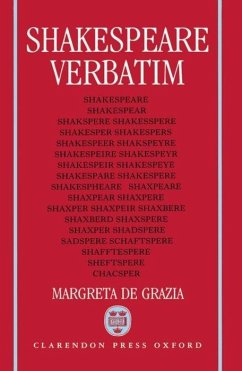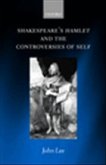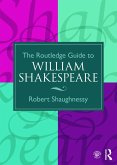Shakespeare Verbatim challenges traditional Shakespeare scholarship through a study of its textual primacy in the late eighteenth century. The book's examination of earlier treatments demonstrates that concepts now basic to Shakespeare studies were once largely irrelevant. Only with Edmond Malone's 1790 Shakespeare edition do such criteria as authenticity, historical periodization, factual biography, chronological development, and in-depth readings become dominant. However, their emergence then must not be seen as the overdue installation of proper scholarly and literary procedures, but rather as a specific historical response to the problem the Shakespeare corpus has posed since its definition by the 1623 Folio. The remarkable efficacy of Malone's apparatus over the past two hundred years testifies not to its 'truth', but rather to its endorsement of a continuing Enlightenment epistemology irreconcilable with the past linguistic and mechanical practices it purports accurately to reproduce. This challenging book has both practical and theoretical implications for Shakespeare studies in the 1990s and beyond.
This study challenges traditional treatments of Shakespeare through a study of their textual imperatives in the late eighteenth century. The examination of earlier treatments demonstrates that concepts now basic to Shakespeare were once largely irrelevant. Only with Edmond Malone's 1790 Shakespeare edition do such criteria as authenticity, historical periodization, factual biography, chronological development, and in-depth reading become necessary as parts of a tightly interlocked textual schema. Their emergence, this text shows, must be seen as a specific historical response to the problem the Shakespeare corpus has posed since its definition by the 1623 Folio: what to make of its heterogeneity and irregularity. Malone's apparatus unified and regulated the texts by making them accountable to Shakespeare the "Author."
This study challenges traditional treatments of Shakespeare through a study of their textual imperatives in the late eighteenth century. The examination of earlier treatments demonstrates that concepts now basic to Shakespeare were once largely irrelevant. Only with Edmond Malone's 1790 Shakespeare edition do such criteria as authenticity, historical periodization, factual biography, chronological development, and in-depth reading become necessary as parts of a tightly interlocked textual schema. Their emergence, this text shows, must be seen as a specific historical response to the problem the Shakespeare corpus has posed since its definition by the 1623 Folio: what to make of its heterogeneity and irregularity. Malone's apparatus unified and regulated the texts by making them accountable to Shakespeare the "Author."








